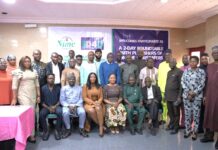ICT Policy Missteps, Lingering Challenges Weaken GDP Growth
TECH DIGEST – Policy missteps by the Federal Government, especially on issues bordering the telecommunications sector, lingering insecurity and other challenges might have tapered economic growth in the first quarter of the year, as the country’s Gross Domestic Product (GDP) grew by 0.51 per cent.
Despite recovery by the manufacturing sector, other key drivers of the GDP growth rate for the Q1 2021 period recorded a decline, accounting for the slow growth rate of the economy.
Indeed, some Federal Government policies might have contributed to the drop in the contributions of the ICT sector to the country’s GDP in Q1 2021, as statistics from the NBS showed that the ICT sector grew by 6.31 per cent in Q1 2021 from 14.70 per cent in Q4 2020 and 9.99 per cent in Q1 2020. The telecommunications and information services under ICT sector grew by 7.69 per cent in Q1 2021 from 17.64 per cent in Q4 2020 and 9.71 per cent in Q1 2020.
From the NBS statistics, it can be deduced that ICT sector on QoQ basis, dropped by 8.39 per cent, while the telecoms sector was down by 9.95 per cent.
Recall that on December 7, 2020, there was a directive by the Federal Government to suspend the sale and activation of new SIM Cards issued to Mobile Network Operators (MNOs). The suspension further led to the compulsory linking of Nigerians National Identification Number (NINs) to their Subscribers Identification Modules (SIM) cards.
Though, the suspension of new SIM cards activation has been lifted, and there is an extension to June 30 for NIN to SIM linkage, within the five months period that the suspension was active, about 15 million telephone lines were lost, while about N30 billion loss was recorded by network operators.
Activities in the agricultural sector showed that the sector grew by 15.14 per cent year-on-year in nominal terms in Q1 2021, showing a decline of -7.33 per cent points from the corresponding quarter of 2020.
Crop production, which is the major driver of the sector, having accounted for 71.69 per cent of overall nominal growth of the sector in first quarter 2021, recorded slower quarter-on-quarter growth of –18.80 per cent in the first quarter of 2021.
With recovery in the manufacturing sector, real GDP growth in the sector in the first quarter of 2021 was 3.40 per cent (year on year), higher than the same quarter of 2020 and the preceding quarter by 2.97 per cent points and 4.92 per cent points respectively.
The International Monetary Fund (IMF) had in April in its updated World Economic Outlook, revised upward its growth forecast for the Nigerian economy in 2021 to 2.5 per cent from its earlier projection of 1.5 per cent it announced in January.
However, there are concerns about the country’s structural problems in the form of foreign exchange pressures, spiralling consumer prices, repressed purchasing power, heightened unemployment levels, weak investor confidence, worsened insecurity and social tensions.
Indeed, members of the Organised Private Sector (OPS), including the Lagos Chamber of Commerce and Industry (LCCI), expressed surprise at the GDP data noting that the economy is still struggling to recover from the shocks of the pandemic and recession.
According to the LCCI Director-General, Dr Muda Yusuf, the recovery of manufacturing sector from a negative growth territory in Q4 2020 to a positive growth level of 3.4 per cent in Q1 2021 was also a pleasant surprise, noting that the sector had been grappling with an unprecedented foreign exchange illiquidity over the past few months.
“This is coupled with the structural, policy, institutional and macroeconomic challenges. The data does not reflect the reality with most manufacturers. Most foreign exchange dependent manufacturing sectors have not had a good experience in the past one-year. Admittedly, segments of manufacturing with high levels of backward integration had lesser degree of shocks from the forex illiquidity in the economy.
“We note with concern the continued contraction of the trade sector which recorded a negative growth of 2.43 per cent. The sector has been grappling with headwinds arising from exchange rate depreciation and illiquidity, high inflationary pressures, and weak purchasing power. Yet the sector is one of the biggest sources of employment, especially in the self-employment space.
“It is equally worrisome that the transportation sector experienced the worst contraction at 21.9 per cent in the first quarter of 2021. This may be as a result of the growing insecurity on our roads. This goes to demonstrate the multidimensional impact of insecurity on the economy”, he added.
The Director-General of Nigeria Employers Consultative Association (NECA), Dr. Timothy Olawale, said the socio-economic impacts of the GDP should translate to the well-being of the masses.
Read Also:
He urged that the policies government had done to improve the GDP should be sustained and improved on.
Noting that the inflationary trend, especially, food inflation had been a major issue, as most Nigerians are finding it difficult to fend for themselves due to low income, he urged that the impact should be felt on the masses.
Similarly, former president of the Chartered Institute of Bankers Nigeria (CIBN), Prof. Segun Ajibola, who also commended the result and its improvements when compared to last quarter of 2020, said if the trend were sustained, the economy would improve significantly.
He said if government faithfully implements incentives on ground, support private sector significantly, and also improves on information, communication and technology (ICT), the economy would grow and GDP growth would keep improving.
Reacting to the GDP development, National Coordinator, Alliance for Affordable Internet (A4AI), Olusola Teniola, said the reversal in GDP percentage and telecom contribution to below Q1 2020 signifies the trend for consumers to preserve their household incomes to essential items.
Teniola said consumer spending powers has waned and felt the impact of double digit inflation and masked unemployment figures that will reveal the impact of post COVID-19 on many business models across all sectors of the economy.
He explained that the story of the SIM registration policy that halted growth in 2020 is reflected in the reversal in Q1.2021 numbers and a heavy reliance on the usage of WhatsApp and other VoIP apps to communicate has and will further reflect in consumer usage pattern going forward.
According to him, a slow down is expected going forward with the recently revised SIM-NIN policy. On his part, the Chairman, Mobile Software Solutions, Nigeria, Chris Uwaje, explained that GDP viewed from expenditure approach is the most commonly used formula, which is based on the money spent by various groups that participate in the economy, but when viewed from income approach, this GDP formula takes the total income generated by the goods and services produced.
According to him, based on the above, the telecoms support sector in Nigeria is driven by SME support. He said indicators from the SME sector show that the impact of the COVID-19 pandemic returned negative growth to the SMEs and indeed, many went under.
“However, if the focus is on the mega telecoms companies, growth was achieved but did not benefit employment. Rather, employment in the sector worsened. Viewed from the CBN’s tactical devaluation of the Naira leading to hyperinflation, it becomes extremely difficult to claim reasonable GDP growth. NBS data revealed high unemployment nationwide hence productivity declined sharply,” he added.
An economist, Johnson Chukwu, described the improvement by 40 basis points in Q1, 2021 GDP from 0.11 per cent achieved in Q4, 2020 to 0.51 per cent in Q1, 2021 as a big relief.
However, he expressed dismay at the non-oil sector, which constituted the bulk of employment opportunities declining by 90 basis points from 1.69 per cent to 0.79 per cent. Chukwu stressed the need for government at all levels to focus more in initiating policies that would stimulate growth in the non-oil sector.
He further identified the non-oil sector as the major driver of the nation’s economic growth in 2021. Sheriffdeen Tella, a professor of economics at Olabisi Onabanjo University, Ago-Iwoye said the growth in the GDP for the quarter was expected given the increase in the price of crude oil from around $40 to around $70 per barrel since the beginning of the year.
However, he argued that government should intensify efforts at developing the non-oil sector, especially agricultural and industry for increased food production and export opportunities to generate foreign exchange.
He said: “One would wish that our non-oil sector, particularly agriculture and industry, also picked up. It would have been a cheery news because that will indicate real growth. That’s why government must do something quickly about insecurity and power infrastructure,” he said.
While Prof. Ken Ife, a London Enterprise Ambassador & Chief Economic Strategist in ECOWAS Commission expressed satisfaction with the outcome with excitement, a pubic finance and tax expert with Actionaid Nigeria, Celestine Okwudili Odo expressed doubt at the positive growth outcome, given the prevailing economic indices like elevated unemployment and heightened borrowings.
“This is a very positive development, given that that is planting season. If we can post this impressive output at this time, it means there is hope for better results in subsequent quarters. However, to sustain this positive output, government must quickly undertake action to address insecurity to encourage investors confidence, which will drive employment and further economic output,” he said.
On the flip side, Odo expressed a seeming shock, wondering how it was possible that an economy with an elevated poverty and unemployment, as well as a huge debt burden could be posting such a positive result at this time.



















